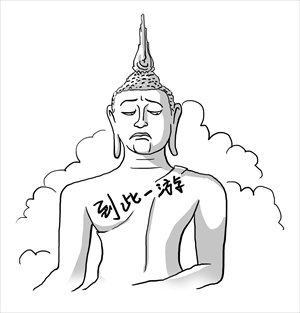Chinese tourists' behavior mars reputation

Chinese people going global contribute not just to the world economy, but also to global civilization.
For years, we've been chanting that "an opening-up China is warming up to embracing the world." However, there is one prerequisite to such an embrace - the Chinese should first abide by a code of conduct in accordance with international practice and behave in a civilized way.
During the Spring Festival holiday, batches of Chinese tourists thronged into Thailand. Due to the low-budget comedy hit Lost in Thailand, which grossed a new box office record, the number of Chinese tourists traveling in Chiang Mai soared overnight. In this holiday alone, there were 26 charter flights bringing Chinese tourists there, and many Chinese tourists rented cars to travel around the city.
The arrival of Chinese tourists certainly benefits the local economy, which is welcomed by Thailand.
However, some Chinese tourists fail to obey local laws and regulations, and their behavior violates Thai customs and habits. The Nation, a newspaper in Thailand, recently published letters from readers grumbling about Chinese tourists' annoying behavior.
One Thai wrote, "Chinese tourists are too boisterous. They tend to drive fast on the wrong side of the road, and often go against traffic on one-way streets."
He also mentioned that "some hotel and guesthouse operators are turning them away because they say Chinese tourists often rent a room for two, but stay in a group of four or five. They also deplore their tendencies to litter and hang their clothing on the balcony railing."
Another reader wrote that there are even more stories to tell - some Chinese girls wear shorts when visiting Buddhist temples, and one Chinese male, when asked why he and his group came to Chiang Mai, claimed: "I am rich!"
Among the problems that Thai people complain about, some violate local laws and regulations, while others relate to differences in custom and habits. These may seem trivial, but actually reflect the serious lack of cultural awareness of Chinese citizens.
Recently, the inscription "Liang Qiqi traveled here" was found on a cultural relic in the Forbidden City by a Chinese tourist, incurring public wrath. Fundamentally, this shows that some improper actions taken by Chinese tourists abroad are a natural "extension" of their domestic habits.
Five years ago, while traveling in the Frederiksborg Palace in Denmark, I saw a name in Chinese characters inscribed on a window.
It is unknown how many Chinese people have left their name on ancient relics across the world. Is this the Chinese way of warmly embracing the world?
Traveling is not just an economic behavior, but more a cultural one. And cultural communication is often restrained by some basic civilized norms that are recognized throughout the world, such as respecting local laws, regulations and custom.
Tourism deepens mutual understanding, which helps achieve mutual respect. Nevertheless, no one will win respect simply for being rich. This especially deserves the attention of Chinese going abroad.
Foreigners see China's image not only when they travel in China, but also when they meet Chinese people traveling elsewhere.
We often say that China has a great civilization, citing Confucius as a great example. However, such greatness cannot be simply convened through theoretical concepts. We should demonstrate it through our living habits, norms and basic manners.
In this era marked by convenient personal interaction, when it comes to truly influencing others, it's not that important how profound an ancient civilization a country has or how many expensive relics its museums house.
What really matters is whether its people's behavior is in line with international common practices. This is a problem that every single Chinese faces when they go abroad.
The author is a senior editor with People's Daily. He's now stationed in Bangkok. dinggang@globaltimes.com.cn